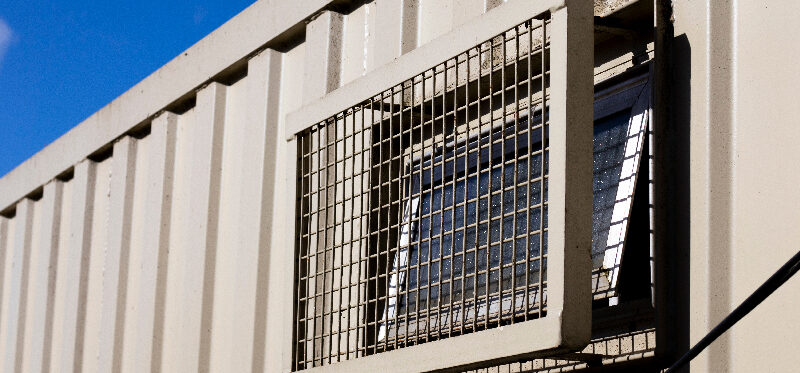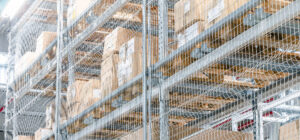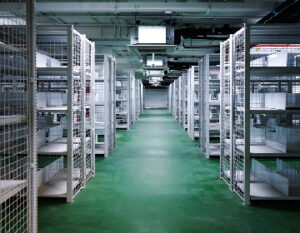
Exploring the Versatility of Industrial Metal Mesh in Industrial Design
Introduction
Have you ever witnessed the captivating interplay of sparks caught in an industrial wire mesh filter within a furnace, or admired a catwalk gracefully hanging overhead, its structure reinforced by the mesh? These sights challenge the common perception of metal mesh, as merely utilitarian in industrial design. California Wire Products, a leader in the field, brings you this blog that will dismantle this stereotype, revealing the surprising versatility and beauty of the wire mesh in various industrial applications. Keep reading to find out!Understanding Industrial Metal Mesh
Industrial metal mesh comes in various forms. From robust welded-wire fabric to delicate woven mesh and detailed perforated sheets, each type offers unique characteristics such as strength, flexibility, transparency, and customization. An exciting aspect of metal mesh is its sustainability, with options for recycled or repurposed materials gaining popularity.Creative Applications in Industrial Design
Separation & Screening
Using industrial woven wire mesh for partitions, conveyor belt enclosures, and safety barriers offers controlled access, filtration, and visual separation. Dynamic mesh screens are not just functional but also visually intriguing.Structural & Support Elements
Metal mesh, particularly industrial wire mesh, with its excellent strength-to-weight ratio, is ideal for structures like walkways, platforms, and mezzanine floors. This segment highlights innovative applications in lightweight yet sturdy structural components and furniture.Ventilation & Filtration
The effectiveness of industrial woven wire mesh in air and fluid filtration systems is crucial in maintaining safe, efficient work environments. Innovative uses, including ventilation grilles that blend seamlessly with architectural designs, will be showcased.Aesthetics & Functionality
Wire mesh adds texture, depth, and visual interest to industrial spaces. We’ll highlight how this material, especially in the form of perforated sheets, can be creatively used with lighting effects and in designing furniture and decorative elements.Considerations Before Choosing Wire Mesh Industrial Applications
Material Selection
When choosing the right industrial wire mesh for your project, it’s crucial to consider the material from which the mesh is made, as this will significantly impact its durability, resistance, and suitability for your specific application. Here are some commonly used materials in industrial wire mesh manufacturing:- Stainless Steel: Highly durable and resistant to corrosion and high temperatures, stainless steel wire mesh is ideal for harsh environments and applications requiring sanitary conditions, such as food processing and pharmaceutical manufacturing.
- Galvanized Steel: Galvanized steel wire mesh is coated with a protective layer of zinc to offer enhanced corrosion resistance. It’s suitable for outdoor applications, including fencing and security screens, where exposure to the elements is a concern.
- Aluminum: Lightweight and resistant to corrosion, aluminum wire mesh is easy to work with and is a good choice for applications requiring less structural strength, such as decorative screens or ventilation panels.
- Copper: Known for its excellent electrical conductivity, copper wire mesh is often used in applications such as electromagnetic shielding and in the aerospace industry. It also offers a unique aesthetic appeal for architectural applications.
- Brass: Brass wire mesh, made from an alloy of copper and zinc, provides good corrosion resistance and strength. It is commonly used in filtering, decorative applications, and in situations where electrical conductivity is required.
- Nickel: Nickel wire mesh offers exceptional resistance to corrosion and high temperatures, making it suitable for chemical processing, heat treatment, and marine applications.
Strength
The load-bearing capacity and tensile strength of the mesh are paramount, especially in applications where structural integrity is a concern. The choice between lighter, flexible meshes and heavier, more rigid ones should align with the intended use.Filtration Level
The size and density of the mesh play a pivotal role in determining its filtration capabilities, making it essential to select the appropriate mesh specification for your needs. Finer meshes, characterized by a higher number of wires per inch, are adept at filtering small particles and are commonly used in applications requiring precise separation, such as in the pharmaceutical, food and beverage, and chemical industries. Conversely, coarser meshes are designed with fewer wires per inch, making them ideal for filtering larger debris. They are often employed in applications where the primary goal is to prevent the passage of large particulate matter, such as in water treatment facilities, agricultural processes, and industrial machinery protection. Additionally, specialized filtration types can further enhance the functionality of wire mesh in diverse applications:- Surface Filtration: This involves particles being trapped on the surface of the mesh. It’s suitable for environments where easy cleaning and maintenance are required.
- Depth Filtration: Particles are captured within the layers of the mesh material, ideal for more complex filtration where multiple particle sizes need to be removed.
- Sieve Filtration: This method uses the mesh as a sieve to separate particles based on size, commonly used in the food production and mineral processing industries.
Visibility and Aesthetics
The openness of the mesh affects not only the visibility through it but also contributes to the overall aesthetic appeal of the design. The choice should complement the architectural style and intended visual impact.Environmental Resilience
Consider the environmental conditions the mesh will face, such as exposure to chemicals, extreme temperatures, or corrosive elements. Materials like stainless steel or coated meshes offer enhanced durability in harsh conditions.Compliance with Regulations
Ensuring that your chosen industrial wire mesh adheres to relevant safety standards, building codes, and regulatory requirements is essential for both legal compliance and the safety of the installation. Here are some basic compliances to consider:- ASTM International Standards: Many industrial materials, including wire mesh, are subject to standards set by ASTM International. These standards cover the specifications, testing methods, and applications to ensure materials meet quality and safety criteria.
- ISO Standards: The International Organization for Standardization (ISO) provides global standards for various products, including industrial wire mesh. Compliance with ISO standards ensures that products meet international safety and quality benchmarks.
- OSHA Regulations: The Occupational Safety and Health Administration (OSHA) sets guidelines to ensure workplace safety. For industrial applications, ensuring that wire mesh installations comply with OSHA guidelines is crucial to protect workers and avoid penalties.
- Local Building Codes: Depending on the location of the installation, local building codes may have specific requirements for materials used in construction and industrial applications. These codes ensure that installations are safe and compliant with regional regulations.
- Environmental Compliance: For applications that may impact the environment, compliance with environmental regulations, such as those set by the Environmental Protection Agency (EPA), is necessary. This includes considerations for materials that are eco-friendly and safe for use in sensitive environments.
Fabrication & Installation
Cutting and Shaping
Employing the right techniques for cutting and shaping the mesh is crucial for maintaining its structural integrity. Techniques like laser cutting or water jet cutting offer precision and minimize material wastage.Welding Practices
When welding industrial wire mesh, it’s essential to use appropriate welding methods to avoid damaging the mesh. Factors like the type of material, thickness, and intended use dictate the welding approach.Installation Tips
Installing metal mesh requires careful planning to ensure it fits perfectly and functions as intended. Tips include:- Assess the structural support needed.
- Consider the expansion and contraction of the material in different temperatures.
- Ensure secure fastening to prevent sagging or displacement over time.
Maintenance & Upkeep of Industrial Metal Mesh
Cleaning Protocols
Based on the importance of regular cleaning for preserving both the appearance and longevity of industrial wire mesh, the cleaning methods chosen should be tailored to the specific material of the mesh and the type of debris it has accumulated. Here are some cleaning protocols for different materials:- Stainless Steel Mesh: For stainless steel, a mild detergent mixed with warm water is effective for general cleaning. For tougher stains or grease, a solution of vinegar and water can be used, followed by a thorough rinse with clean water to prevent corrosion. Stainless steel polish can also be applied to enhance shine after cleaning.
- Galvanized Steel Mesh: Galvanized mesh should be cleaned with a gentle cleaner to avoid removing the zinc coating. Soft brushes or cloths can be used to apply soapy water, followed by rinsing with clean water. Avoid acidic cleaners which can damage the galvanization.
- Aluminum Mesh: Aluminum can be cleaned with a solution of mild detergent and water. For oxidation or mild corrosion, a mixture of white vinegar and water can help restore its appearance. Rinse thoroughly after cleaning to remove any residue.
- Copper and Brass Mesh: These materials can tarnish over time, so a mixture of lemon juice and baking soda can be applied to restore their natural luster. Rinse with water and dry immediately to prevent water spots.
- Nickel Mesh: Nickel mesh can be cleaned with warm soapy water and a soft cloth. For maintaining its shine, a mild metal polish designed for nickel can be used sparingly.
Repair Strategies
When it comes to repairing industrial wire mesh, addressing damage promptly is essential to preserve its functionality. The choice of repair strategy depends on the severity of the damage and the specific type of mesh involved. Here are some strategies for various scenarios:- Patch Repair: For localized damage, such as small tears or holes, applying a patch of the same material and mesh size can effectively restore integrity. This is often secured with wire ties or welding, depending on the mesh material.
- Welding: For metal meshes like stainless steel or galvanized steel, welding can repair breaks or separations. This requires precision and the right welding technique to ensure the repair blends seamlessly with the rest of the mesh and maintains its strength.
- Soldering: For finer meshes or those made from materials like copper, soldering can be a suitable repair method. It allows for delicate repairs that require a less intense heat source than welding.
- Replacing Sections: When damage is extensive but localized, replacing entire sections of the mesh may be more practical than attempting numerous small repairs. This ensures the mesh’s uniformity and strength over large areas.
- Tightening and Re-securing: Sometimes, the issue may not be damage to the mesh itself but loosening from its frame or support structure. In such cases, re-securing the mesh to its supports or tightening connections can restore functionality.
- Professional Restoration: For complex or delicate meshes, especially those used in specialized applications (e.g., fine filtration or artistic installations), professional restoration might be necessary. Experts in mesh manufacturing and repair can provide services that ensure the mesh is restored to its original specifications.
Long-Term Maintenance
Establishing a routine maintenance schedule helps in early detection of potential issues and extends the lifespan of the mesh. This includes regular inspections for signs of wear, corrosion, or structural weakness. A careful consideration of these factors ensures that your choice of industrial wire mesh not only meets the immediate requirements of your project but also stands the test of time in both functionality and aesthetics.Conclusion
We manufacture the most effective modular system available for all your security requirements and access control, providing customized and ready to go options for all your needs. Reflecting on the transformative potential of industrial wire mesh, we recognize its journey beyond traditional utilitarian roles. At California Wire Products, we encourage the exploration of this material’s unique blend of strength, versatility, and beauty in industrial design. Call us at (951) 371-7730 for more information.FAQs
FAQ 1: What is Industrial Metal Mesh? Answer: Industrial metal mesh refers to a versatile material made from interlinked metal wires or sheets. It comes in various forms like industrial wire mesh or industrial woven wire mesh, each having unique characteristics such as strength, flexibility, and transparency. It’s widely used in industrial design for applications ranging from structural support in walkways and catwalks to aesthetic enhancements in architectural designs. FAQ 2: What are the main benefits of using industrial metal mesh in design? Answer: Industrial metal mesh offers several benefits: its strength and durability make it ideal for structural applications, while its flexibility allows for creative design uses. Additionally, it provides excellent filtration capabilities, can be aesthetically pleasing, and is often made from sustainable materials, contributing to environmentally friendly design solutions.: Choosing the Right Industrial Metal Mesh FAQ 3: How do I choose the right type of industrial metal mesh for my project? Answer: Choosing the right industrial metal mesh depends on several factors including the required strength, desired level of filtration, aesthetic considerations, environmental conditions it will face, and compliance with safety standards. It’s important to evaluate the specific needs of your project and consult with experts like California Wire Products to ensure the best selection.GET IN TOUCH
Contact us today to place your wire mesh order!


